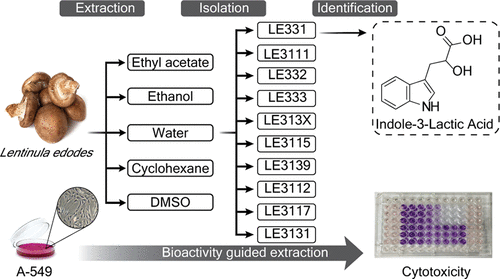当前位置:
X-MOL 学术
›
ACS Food Sci. Technol.
›
论文详情
Our official English website, www.x-mol.net, welcomes your feedback! (Note: you will need to create a separate account there.)
Extraction, Isolation, and Identification of Cytotoxic Secondary Metabolites from Shiitake Mushroom 808 Lentinula edodes (Berk.)
ACS Food Science & Technology Pub Date : 2021-03-25 , DOI: 10.1021/acsfoodscitech.0c00059 Khandaker Md. Sharif Uddin Imam 1 , Yingying Xie 1 , Yusi Liu 1 , Fengzhong Wang 1, 2 , Fengjiao Xin 1
ACS Food Science & Technology Pub Date : 2021-03-25 , DOI: 10.1021/acsfoodscitech.0c00059 Khandaker Md. Sharif Uddin Imam 1 , Yingying Xie 1 , Yusi Liu 1 , Fengzhong Wang 1, 2 , Fengjiao Xin 1
Affiliation

|
Lentinula edodes (Berk.), commonly known as “shiitake mushroom”, is one of the most popular species of cultivated edible mushrooms (22% of the world’s production). In addition to its culinary popularity, L. edodes is also praised for its nutraceutical and medicinal use as an immunomodulatory, antioxidant, hypolipidemic, hepatoprotective, anti-inflammatory, antitumor, and anticancer agent. Cancer is currently the leading cause of death worldwide, and lung cancers, especially adenocarcinomas (75–85% of all lung cancers), make the largest contribution to this number. Investigating edible and potentially medicinal mushrooms like L. edodes may lead to the discovery of prospective anticancer agents. Here we extracted the shiitake QF808-1 strain, a popular variety of L. edodes from China, using five solvents. Among the samples, the aqueous extract had the highest number of metabolites while exerting dose-dependent bioactivity by inhibiting A549 lung adenocarcinoma cell proliferation, with a half-maximal inhibitory concentration (IC50) of 198.5 μg/mL. Further bioactivity-guided fractionation of the aqueous extract through silica gel column chromatography and semipreparative high-performance liquid chromatography resulted in the isolation of 10 cytotoxic isolates. Comparative cytotoxicity analysis of the isolates showed their IC50 values against A549 cells ranged from 55.03 to 721.14 μg/mL. Identification of the most cytotoxic isolate by UHPLC-Orbitrap mass spectrometry and one-dimensional nuclear magnetic resonance revealed it as indole-3-lactic acid (ILA). Our findings provided evidence of potential anticancer metabolites, including ILA in aqueous extract of L. edodes, and suggested its prospective use in cancer treatment.
更新日期:2021-05-22



























 京公网安备 11010802027423号
京公网安备 11010802027423号